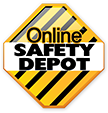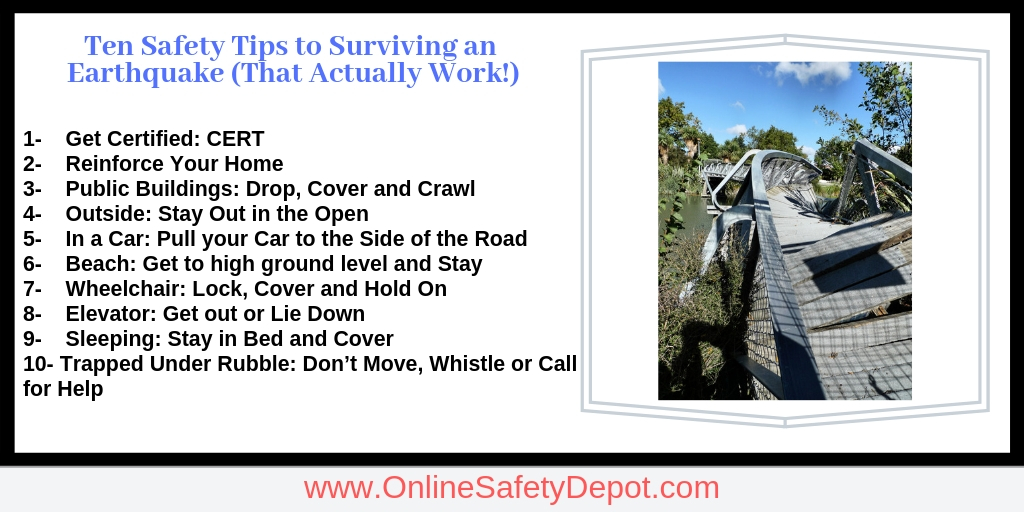Ten Safety Tips to Surviving an Earthquake (That Actually Work!)
I’ve only experienced two earthquakes in my life, both of which were extremely small and were not considered dangerous enough to worry about. This is not always the case. Over the years, thousands have been killed or badly injured as a result of an earthquake. So what do you do in the event of an earthquake? I did a little bit of research and compiled a list of 10 safety tips to surviving an earthquake.
If you find yourself in an earthquake, follow these safety guidelines below – they just could just save your life!
- Get Certified: CERT
- Reinforce Your Home
- Public Buildings: Drop, Cover and Crawl
- Outside: Stay Out in the Open
- In a Car: Pull your Car to the Side of the Road
- Beach: Get to high ground level and Stay
- Wheelchair: Lock, Cover and Hold On
- Elevator: Get out or Lie Down
- Sleeping: Stay in Bed and Cover
- Trapped Under Rubble: Don’t Move, Whistle or Call for Help
Get Certified: CERT
One of the Best preventive measures to surviving an earthquake or any other disaster is to be prepared and know what to do and how to respond. One of the best programs that is dedicated to helping community members be prepared for a natural disaster is the Community Emergency Response Team program (CERT)
The CERT program educates volunteers in communities from around the country and trains them in disaster preparedness. To better understand the program, take a look at our other article titled, “Overview of the Community Emergency Response Team Program- CERT” or “The Community Emergency Response Teams”. You can also find many other CERT related articles on our website by searching for the term “CERT” in the search bar.
Being Prepared and Reinforce Your Home
If you live in an earthquake prone area, reinforcing your home for a possible earthquakes will protect you, your family members and your home itself. You never know when an earthquake will strike. Consider the following tips to help you be prepared.
1- Move beds away from the windows. During an earthquake, glass can break and shatter, sending razor sharp bits of glass flying in the air. IF an earthquake occurs during the night, you want to be away from the window.
2- Place heavy objects at the bottom of a shelf. Objects on shelves, counters and desk will fall off due to the vibration of the earthquake. Only place smaller objects on the upper shelves and the larger and heavier objects on the lower shelves.
3- Cover glass with shatter proof film. If you have glass cabinet doors or shower doors, consider covering them with a clear shatter-proof film to prevent them from breaking and sending glass everywhere.
4- Install automatic shutoff valves. To prevent water and gas from leaking into your home, install automatic shutoff valves. This will prevent further damage to your home as well as the dangers of leaking gas.
If gas is leaking into or around your home, a simple spark or small flame can cause the gas to ignite. This will cause an explosion that will badly injure or possibly kill those in the home.
5- Emergency Kit and Food. It is extremely important to have an emergency kit in your home that you can quickly grab and go if needed. You should also have enough food for 3 days per person living in the home in case you are trapped and unable to get out.
Some other emergency supplies that you should have are fire extinguishers, batteries, flashlights, battery operated radio, medicine and a first aid kit. Read our other article titled “Getting Prepared for Emergencies” to learn how you can be better prepared for an emergency.
6- Insurance. Make sure your home has earthquake insurance. This will help you after the earthquake is done and the damage has been assessed. Don’t let a natural disaster be a financial burden.
Public Buildings: Drop, Cover and Crawl
If you’re in a public building such as a bank, shopping center or grocery store, immediately drop to the floor on your knees, bend over using one hand to protect your head and neck while slowly crawling to the nearest shelter such as a desk or doorway.
If there are no desks, tables or doorways to hide under, stay in the middle of the room, away from windows or other glass objects.
Do not move until the earthquake has completely stopped. Once the earthquake has stopped, and not until then, leave the building. NOTE: be careful of any potential dangers such as live wires, falling debris or fires.
Outside: Stay Out in the Open
Stay away from any buildings or large objects, powerlines or other objects that could fall over and injure you. During the earthquake, drop to the ground, cover your head and hold onto something or brace yourself. Once the earthquake is done, you may need to help others who have been injured. This is where the CERT training would be extremely valuable!
To learn more about what CERT members do after an earthquake, read our other article titled, “Caring for Survivors of Natural Disasters or Terrorist Attacks – CERT”.
In a Car: Pull Over
Being in a car can be extremely dangerous. Drivers may not be able to fully control their cars and will panic, causing drivers to drive recklessly. If you feel an earthquake, pull the car to the side of the road or into a parking lot. Stay in your car until the earthquake has passed.
Do not park under light poles or powerlines as they may fall on your car. Live wires are dangerous and may electrocute you if you are not careful. To learn more about what to do in the event of a live wire on or near your car, read our other article titled, “What to do if a Live Powerline Falls on your Car”.
Beach: Get to High Ground & Stay
Earthquakes can cause a tsunami. If you are at or near the beach, quickly gather your belongings and move to higher ground. Don’t wait to be instructed on what to do.
Wheelchair: Lock, Cover and Hold On
An earthquake can be especially dangerous if you are confined to a wheelchair. The moment you feel an earthquake, look around for shelter and go there immediately. If there is no shelter to be found, move to an open area where you are free of falling debris.
Once you are in an secure spot, lock the wheels, bend over and cover your head and neck with your arms.
Elevator: Get out or Lie Down
Never use the elevators during or after an earthquake. Elevators are not the safest place to be during an earthquake and the cables may be compromised after an earthquake has occurred. However, if you do find yourself in an elevator during an earthquake, push the button for the next level or the “open door” then quickly lie down on your stomach in the middle of the floor. Cover your neck and head with your arms.
Sleeping: Stay in Bed and Cover
If you are awoken by an earthquake, stay in bed and quickly cover your head with your pillow and arms. If there are bookshelves or other objects that could fall on you, get out of bed and under the bed, table or doorway.
If you have kids in the home, quickly run to their room and help them get under a desk or doorway. Cover them with your body to protect them from falling objects and broken glass.
Trapped Under Rubble: Don’t Move, Whistle or Call for Help
Should the building or your home collapse on top of you during an earthquake and you’re trapped, do the following:
1- Treat any life threating injuries on yourself and others. Note: You may be interested in our other article titled, “Treatment of Survivors of Natural Disasters with Non-Life-Threatening Injuries – Wounds”, “Caring for Survivors of Natural Disasters or Terrorist Attacks- CERT” or “Treatment of Survivors of Natural Disasters with Non-Life-Threatening Injuries – Fractures”.
2- Cover your mouth and nose with a mask, or cloth. The particles in the air may be extremely toxic and can be harmful if you breath it in.
3- Do not light a lighter or match as there may be leaking gas that will explode if ignited.
4- Use a whistle or bang on a pipe to get the attention of first responders. If no such option is available, shout while still covering your mouth to protect you from any foreign particles that may be in the air.
5- Use your phone as a flashlight and to call for help if you have a connection.
Conclusion
Earthquakes are dangerous and can result in serious injury or death. Be prepared by knowing what to do in the event of an earthquake so that you can protect yourself and help others as needed. Consider taking the CERT training program so that you are better prepared for any possible disaster.

